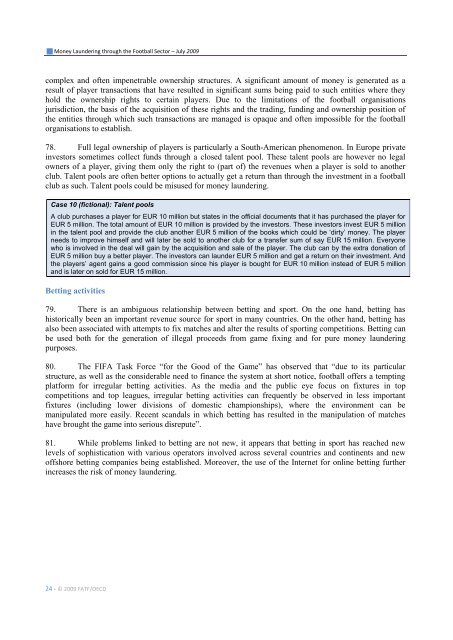Money Laundering through the Football Sector
Money Laundering through the Football Sector
Money Laundering through the Football Sector
Create successful ePaper yourself
Turn your PDF publications into a flip-book with our unique Google optimized e-Paper software.
<strong>Money</strong> <strong>Laundering</strong> <strong>through</strong> <strong>the</strong> <strong>Football</strong> <strong>Sector</strong> – July 2009<br />
complex and often impenetrable ownership structures. A significant amount of money is generated as a<br />
result of player transactions that have resulted in significant sums being paid to such entities where <strong>the</strong>y<br />
hold <strong>the</strong> ownership rights to certain players. Due to <strong>the</strong> limitations of <strong>the</strong> football organisations<br />
jurisdiction, <strong>the</strong> basis of <strong>the</strong> acquisition of <strong>the</strong>se rights and <strong>the</strong> trading, funding and ownership position of<br />
<strong>the</strong> entities <strong>through</strong> which such transactions are managed is opaque and often impossible for <strong>the</strong> football<br />
organisations to establish.<br />
78. Full legal ownership of players is particularly a South-American phenomenon. In Europe private<br />
investors sometimes collect funds <strong>through</strong> a closed talent pool. These talent pools are however no legal<br />
owners of a player, giving <strong>the</strong>m only <strong>the</strong> right to (part of) <strong>the</strong> revenues when a player is sold to ano<strong>the</strong>r<br />
club. Talent pools are often better options to actually get a return than <strong>through</strong> <strong>the</strong> investment in a football<br />
club as such. Talent pools could be misused for money laundering.<br />
Case 10 (fictional): Talent pools<br />
A club purchases a player for EUR 10 million but states in <strong>the</strong> official documents that it has purchased <strong>the</strong> player for<br />
EUR 5 million. The total amount of EUR 10 million is provided by <strong>the</strong> investors. These investors invest EUR 5 million<br />
in <strong>the</strong> talent pool and provide <strong>the</strong> club ano<strong>the</strong>r EUR 5 million of <strong>the</strong> books which could be „dirty‟ money. The player<br />
needs to improve himself and will later be sold to ano<strong>the</strong>r club for a transfer sum of say EUR 15 million. Everyone<br />
who is involved in <strong>the</strong> deal will gain by <strong>the</strong> acquisition and sale of <strong>the</strong> player. The club can by <strong>the</strong> extra donation of<br />
EUR 5 million buy a better player. The investors can launder EUR 5 million and get a return on <strong>the</strong>ir investment. And<br />
<strong>the</strong> players‟ agent gains a good commission since his player is bought for EUR 10 million instead of EUR 5 million<br />
and is later on sold for EUR 15 million.<br />
Betting activities<br />
79. There is an ambiguous relationship between betting and sport. On <strong>the</strong> one hand, betting has<br />
historically been an important revenue source for sport in many countries. On <strong>the</strong> o<strong>the</strong>r hand, betting has<br />
also been associated with attempts to fix matches and alter <strong>the</strong> results of sporting competitions. Betting can<br />
be used both for <strong>the</strong> generation of illegal proceeds from game fixing and for pure money laundering<br />
purposes.<br />
80. The FIFA Task Force “for <strong>the</strong> Good of <strong>the</strong> Game” has observed that “due to its particular<br />
structure, as well as <strong>the</strong> considerable need to finance <strong>the</strong> system at short notice, football offers a tempting<br />
platform for irregular betting activities. As <strong>the</strong> media and <strong>the</strong> public eye focus on fixtures in top<br />
competitions and top leagues, irregular betting activities can frequently be observed in less important<br />
fixtures (including lower divisions of domestic championships), where <strong>the</strong> environment can be<br />
manipulated more easily. Recent scandals in which betting has resulted in <strong>the</strong> manipulation of matches<br />
have brought <strong>the</strong> game into serious disrepute”.<br />
81. While problems linked to betting are not new, it appears that betting in sport has reached new<br />
levels of sophistication with various operators involved across several countries and continents and new<br />
offshore betting companies being established. Moreover, <strong>the</strong> use of <strong>the</strong> Internet for online betting fur<strong>the</strong>r<br />
increases <strong>the</strong> risk of money laundering.<br />
24 - © 2009 FATF/OECD


